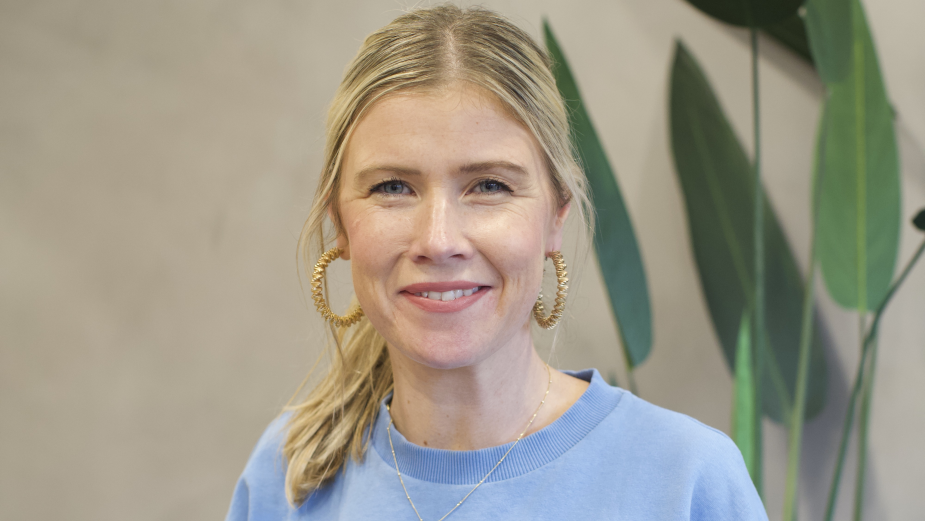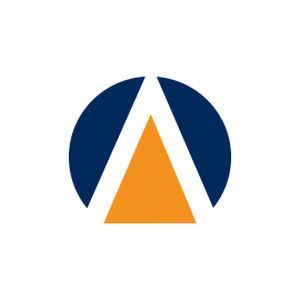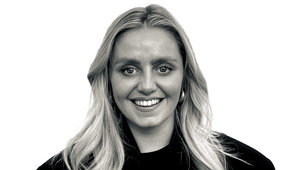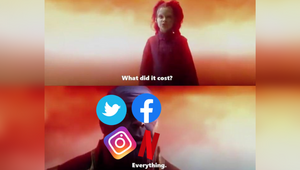
Bossing It: Miriam Moertl on How You Can’t Underestimate the Power of Honesty and Empathy in Leadership

Miriam Moertl is the head of client services and board director at leading advertising and design agency, Ardmore.
Originally from Yorkshire, Miriam has almost 15 years of experience in the advertising industry and has previously worked with brands including Sport England and Proctor & Gamble.
Footloose and fancy free, she left leading ad agency Poulters, relocated to Northern Ireland in 2013 at the tender age of 23 and now leads a dynamic team across a diverse range of Ardmore’s clients including Stena Line, Lidl, Network Rail, Translink and Dale Farm.
Miriam was appointed to the Ardmore Board of Directors at the age of 32 and is passionate about collaboration, creativity and people in her work.
Here she shares how empathy in leadership and being true to herself, as well as continual professional development, helped her hone her leadership skills.
LBB> What was your first experience of leadership?
Miriam> The early years of my career saw me working with several inspirational leaders, including Sarah Giangregorio and James French of Poulters, a leading Northern agency of its time, both of whom demonstrated the impact of shaping a positive, inclusive culture. The confidence they instilled in me subsequently encouraged my move from Leeds to Belfast at the age of 23.
However, what really unlocked my potential for lifting my head above the parapet and stepping into a leadership role, was when I started working with Mike Reid, former Chairman of Tayburn and MD of Sapient, in 2017 who had been brought into Ardmore in an advisory capacity. Mike is an incredible mentor and identified an ability within me to take my effectiveness to the next level. True leadership!
Within the year I was appointed to Ardmore’s Board of Directors and really started on my leadership journey where I began to directly support John Keane, CEO, and Mark Irwin, MD, on wider company goals. They continue to nurture my potential and ambitions and I don’t underestimate how lucky I am to have that influence and support.
LBB> How did you figure out what kind of leader you wanted to be – or what kind of leader you didn’t want to be?
Miriam> The hard way! I made plenty of mistakes along the way and I’m sure I’ll make more!
I definitely picked up some bad habits along the way from exposure I’d been given to management and leadership in a previous life, in scenarios where power and control were used in the absence of influence and inspiration. Whether it was their delivery, or my interpretation and naivety in finding my way, I got off on the wrong footing! In the absence of understanding what effective leadership looked like, I found myself mirroring these characteristics when it came to moving from a passenger to a driver.
A period of self-reflection, and, honestly, just growing up a bit, allowed me to soon realise what kind of leader I didn’t want to be.
Instead, I took the approach to strip back all my preconceptions of what being a leader meant, just be myself, lean into a number of mentors, and suddenly everything became much clearer, easier and more enjoyable.
LBB> What experience or moment gave you your biggest lesson in leadership?
Miriam> My progression through Ardmore has been relatively quick and whilst it has presented many opportunities, it’s also been challenging to navigate at times. My biggest failures have come from my inability to communicate effectively. My tendency to wear my heart on my sleeve, tweaking my approach, my language and my mindset have been pivotal for me.
• Learning to let go - initially this came from developing my management and delegation skills, and then, in more recent years, stepping away from the day to day and directing my energy towards guiding, inspiring and influencing.
• Patience – I believe that to truly lead, you should meet your team where they are. It’s not always about applying our own “standards” and then being disappointed when people are different. Because firstly I’m obviously not always right, and secondly, diversity in cognition is how we all improve.
• Empathy – I have always had an empathetic approach to people and scenarios, but at one time I would have seen the outward expression of this as weak. It’s now fundamental to my input in leading a team.
• Communication, and my default style - I’ve had to be mindful around my communication skills. If I’m really being honest, in the past I’ve found myself overcompensating and trying to mirror my male peers. Not only is that wrong because I am a woman, and proud of it (!), but trying to mirror anyone isn’t sustainable, and you have no hope of leading anyone if you are not your true self.
• Being myself - I have and continue to use try and use my voice effectively…a fundamental of effective leadership, right? But I try to show my team that you can also lead through demonstrating value, inputting positively and being able to follow and support a shared vision in your behaviour.
LBB> Did you know you always wanted to take on a leadership role? If so, how did you work towards it and if not, when did you start realising that you had it in you?
Miriam> In truth, I fell into leadership. I joined Ardmore as an Account Manager, from there worked up to Account Director, and then to Senior Account Director. I had assumed responsibilities on behalf of the client team (financial, process etc) and by default the responsibilities of managing the team. I was a successful manager with the knowledge and technical skills, and the ambition to lead, but I couldn’t get the two things aligned.
At this point I don’t mind admitting that I really wasn’t enjoying my role either, so something had to change. Whilst training and access to a mentor is essential for us all, I do believe that individuals have a responsibility to cultivate themselves. The value of being able to reflect (and receive brutally honest feedback!) led me to understand why effective leadership was going to help me achieve better results.
From there I gained a Certificate in Leadership and Management, “linkubator,” awarded by The City and Guilds of London Institute. Together with some mentoring, that gave me the foundations to progress towards the role of Head of Client Services.
After much growth and development, I now thoroughly enjoy leading the team towards our shared agency vision.
LBB> When it comes to “leadership” as a skill, how much do you think is a natural part of personality, how much can be taught and learned?
Miriam> For me, you have to want to be a leader for it to work. It sounds obvious but it can’t just be a box that’s ticked as part of a job description - you have to have that ambition within you. You might not initially be very good at it (!), but the yearn has to be there.
From there, with some hard work, honestly, I think a leader can be made; either skills learned, or characteristics shaped. An effective mentor is crucial.
I think it’s the twists and turns within your own leadership journey which provides you with the opportunity to learn and improve.
LBB> What are the aspects of leadership that you find most personally challenging? And how do you work through them?
Miriam> Finding and protecting the space and energy to inspire and lead whilst simultaneously managing (areas of) the business can be challenging. What helps me achieve that balance is the strength of the team around me, and my desire to empower others - which leaves me with opportunity to draw breath and let go.
Navigating under-performance, especially when it can’t be fixed, and leading a team out of those often-delicate situations can be hard and it’s important to be sensitive yet guide the team with confidence into a more positive and constructive space.
Right now, what has been coined “The Great Resignation” presents real challenges for businesses and for me, personally, as a leader. Speaking candidly, we are usually relaxed about our people moving on to new opportunities. We understand that’s the way the world turns, and in fact, we often take it as a compliment; that our pool of talent is the first place our competitors go to when they are recruiting.
But the pandemic has forced an element of self-reflection in us all and most industries are experiencing a big watershed moment; we are either actively seeking change, or we are being impacted by it. And that doesn’t just mean moving onto pastures new, it can mean role changes, too.
As a leader I am busy juggling a period of exponential positive recovery for the business and our clients, and also ensuring our people are settled and don’t underestimate the impact they can make within the business.
LBB> In terms of leadership and openness, what’s your approach there? Do you think it’s important to be transparent as possible in the service of being authentic? Or is there a value in being careful and considered?
Miriam> I think it depends on the context. As an agency and team, I feel we all subscribe to honesty and respect, whilst having the right to challenge one another in a constructive manner. And I’d say the same applies to my approach to leadership.
I think what is important is being careful and considered in your delivery of the truth, whether it is one-to-one and moulding your communication style around the individual, or to a wider agency audience, and being mindful of how what you are saying is being received.
As a business, and particularly post-COVID, we are committed to getting back to physical collaboration and I think that provides opportunity for greater transparency, where the conversation can be managed.
I feel more than anything, honesty and vulnerability are two of the best traits you can possess as a leader; allowing people to resonate with the challenges you are facing.
LBB> As you developed your leadership skills did you have a mentor? If so, who were/are they and what have you learned? And on the flip side, do you mentor any aspiring leaders and how do you approach that relationship?
Miriam> For me, the value of coaching and mentoring is pivotal to my continued development as a leader. Testament to this point is how frequently I mention certain people as I have worked through these questions.
From an external perspective, Gary Longwell and Mike Reid have been instrumental in both guiding me and helping me “reset” on occasion and how I approach and deliver leadership. The benefits of perspectives external to your organisation shouldn’t be underestimated.
John Keane, CEO, and Mark Irwin, MD, alongside Paul Bowen, our Executive Creative Director, offer me different outlooks on how to approach leadership, mentorship, challenging situations and difficult conversations. And actually, there are few people within Ardmore and my wider professional and personal life that don’t offer me other perspectives on how to navigate people and lead them into positive and better times.
And it works both ways. Having the opportunity to mentor and coach around the topic of leadership is a great opportunity to sense check ourselves and our own output. I try to impart the lessons I have learned and what wisdom I have gathered along the way to my own team and people within the wider agency, and again, friends in completely different industries.
I have realised that a strength I have which supports my leadership growth is self-introspection. I believe some of the greatest leaps I have made in becoming an effective leader is looking for the win when I have quite clearly lost! What is the growth opportunity and how can I learn? And for me that doesn’t ever end.
LBB> It's been a really challenging two years - and that's an understatement. How do you cope with the responsibility of leading a team through such difficult waters?
Miriam> Personally, it was a combination of various things that helped get me through, arguably, the toughest time of my career so far.
As a business, we are incredibly lucky that Ardmore continued to invest time, resources, and energy into the wellbeing of their people. For me, I learned the following, in no particular order:
• I developed better, deeper relationships with my existing peers and new ones that were forged because of the pandemic. Those existing and new outlets were vital to be able to cope with the pressures that we all felt across the past 24 months. Whether it was venting, sense-checking, or talking things through. I was lucky to receive greater leadership and support from my fellow Board Directors and Senior Leadership team, and also had an incredible team around me, above, below, and to either side.
• I leant on my mentor, Gary Longwell, for guidance and simply an ear to listen.
• Lunchtimes were ring-fenced for time to go for a walk, hit the treadmill or practice yoga. Or lie down in a dark room! A discipline I’ve taken with me as we’ve emerged into more normal times.
• And finally, showing humility and vulnerability to my team and peers undoubtedly relieved me of pressure. We are all human at the end of the day, trying our best to navigate difficult times.
LBB> Recently, the industry has been confronted with its lack of action/progress on diversity and inclusion. As a leader how have you dealt with this?
Miriam> The focus on diversity across the world has changed over the past few years, and the same can be said for Ardmore.
As a leader within the business, I am amongst a group of individuals that has seen our mindset shift from recognition of diversity from a corporate responsibility perspective, to actively cultivating an ethos of inclusion. We promote the conversation.
Our people are our strongest asset, and we want to share the voice of under-represented groups. From our specific efforts around attracting talent from outside of Northern Ireland, thus widening the opportunity to grow our diversity, to a deliberate focus on equality. We continue to aggressively seek variety in our thinking….in our people, and in turn, our experiences, our backgrounds and our perspectives.
Further to that, the central role that Ardmore has played within Worldwide Partners over the years, a network of independently owned agencies across the globe, has unlocked a level of access to an incredibly diverse pool of like-minded people which is really important for us as a business, and has unlocked some incredible opportunities for our people and our clients.
LBB> How important is your company culture to the success of your business? And how have you managed to keep it alive with staff working remotely?
Miriam> Culture sits at the heart of our business. It’s the energy we project, how we approach collaboration, it dictates how we view performance, and it is all underpinned by inclusion. So yeah, pretty important! Being clear with ourselves on our definition of culture also allows us to stay on track, and bring ourselves back into line when we, inevitably, veer off course.
But whilst it’s built upon various pillars, not least our company values, an ever-changing world has taught us that we can’t be too rigid when defining our culture. As our people evolve, so must the energy of a business, and our expectations.
When COVID hit, we were mindful of how we could deliver consistency in our culture despite the change in working circumstances. There are specific initiatives we put in place including the adaptation of our weekly company-wide gathering onto Teams, a weekly communication from the Board of Directors to the agency, Friday afternoon socials (on video), regular acts of kindness delivered to the door of every employee….the list goes on.
For me as a leader, however, a fundamental of the culture for which I am responsible, is to ensure everyone feels like they belong. Not easy when you’re not physically together for months on end! So, from a combination of weekly one-to-one calls, regular check-ins (not always work-related), and acknowledgement and recognition, every effort was made to ensure that in the absence of physicality, a metaphoric arm around the shoulders was offered.
LBB> What are the most useful resources you’ve found to help you along your leadership journey?
Miriam> I have spoken about the support that my colleagues continue to give me, and I do get a lot of benefit from external resources, too.
I have a decent commute from the County of Tyrone up to Holywood in County Down and so I’ve, by default, become a big fan of a podcast. Whilst I deviate from popular culture (celebrity!) to professional development depending on my level of exhaustion (I’m Mum to two young boys!), I am always drawn to those with a leadership angle.
A specific series is “Coaching for Leaders with Dave Stachowiak” which I think is incredible. It has a great host, quality guest speakers and a wide range of relatable topics. I have taken much guidance and practical tips from many of the episodes over the past couple of years which have definitely had a positive impact on my leadership output.
Like Mike Reid, Gary Longwell, a former Irish International Rugby Player, has (perhaps unbeknown to him!) become a pillar of support to me and a solid mentor. Gary doesn’t have either advertising or agency background so offers a fresh perspective and allows me to take a step back from the fog.
I really enjoy a professional/self-development book and one that I can highly recommend is “Difficult Conversations: How to discuss what matters most,” Douglas Stone, Bruce Patton and Sheila Heen.
Finally, the Worldwide Partners network I mentioned and the opportunities it presents to speak with peers in similar roles, facing similar challenges, always leave me with food for thought as to how I can further develop my leadership journey.













